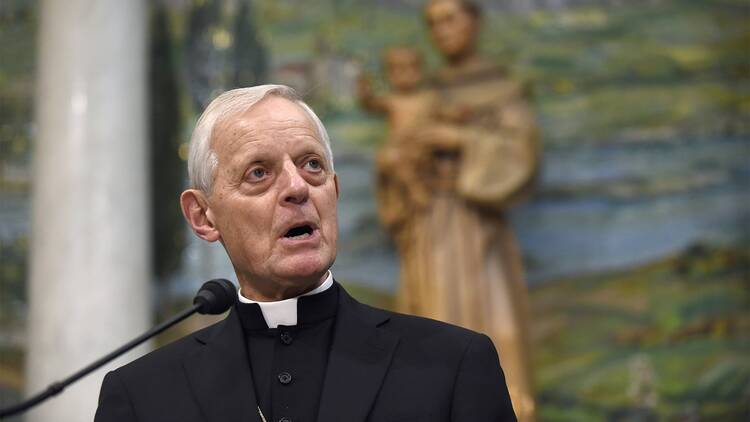(RNS) — The buzz about the resignation of Cardinal Donald Wuerl, who heads the archdiocese of Washington, D.C., had a lot to do with his position: technically, as some outlets pointed out, Wuerl is the most highly ranked member of the American Catholic hierarchy to lose his office in the wake of the bombshell Pennsylvania grand jury report on clergy sex abuse released in August.
But while the height of Wuerl’s fall is dramatic, his departure was not unexpected. By Sept. 11, after a strained meeting with his diocesan priests, Wuerl revealed his intention to travel to Rome and encourage Pope Francis to accept his resignation. (Like most bishops, he submitted his resignation upon turning 75 three years ago, but the pope decides when to accept them.)
The drama surrounding Wuerl’s resignation is only partially about Wuerl himself — it’s also about who’s next.
Nor was Wuerl accused of abuse himself. In fact, at first Wuerl defended himself against some of the allegations in the August report that he reassigned priests who abused children to shield them from accountability, and many others noted that he had, while in Pittsburgh, pushed the Vatican to take a tougher stance on child sex abuse. But public backlash over the summer placed the Archdiocese of Washington under intense pressure all the same.
Wuerl’s tumble was far less dramatic than another episode in June, when Pope Francis ordered retired Washington Cardinal Theodore McCarrick, Wuerl’s predecessor, to cease all public activities following allegations he abused a teenager more than 45 years ago while working in New Jersey as a priest.
Ultimately, the drama surrounding Wuerl’s resignation is only partially about Wuerl himself — it’s also about who’s next. Other bishops, also facing tough questions, could now find themselves beset by calls to follow Wuerl’s example and step down.
In February, a retired priest from the Diocese of Buffalo, N.Y., confessed to the The Buffalo News that he had molested “probably dozens” of boys at multiple parishes from the 1960s until the 1980s. Other allegations of abuse have since emerged via reports from Buffalo’s WKBW-TV 7 Eyewitness News and others, prompting Boston Cardinal Seán P. O’Malley to call on the Vatican to investigate Bishop Robert Malone “for the action or inaction of diocesan leadership in Buffalo with regard to the reports of abuse,” a diocesan spokesman told WKBW-TV.
Cardinal Daniel DiNardo, the archbishop of Galveston-Houston, Texas, and head of the U.S. Conference of Catholic Bishops, is also confronting allegations he ignored rampant sexual abuse of children by a priest under his purview when he was a bishop in Sioux City, Iowa. DiNardo apologized for any failures 16 years ago, admitting that allowing the priest to continue volunteer duties at a church after forced retirement was a “mistake that we regret.”
But DiNardo is now facing a similar issue in Texas, where a priest was arrested in September on charges of sexually abusing children in the region from the late 1990s to early 2000s. DiNardo has been accused of not doing enough to remove the priest from ministry, although the Archdiocese of Galveston-Houston argued in a statement that complaints about the cleric were referred to Child Protective Services.
As the scandal builds, Texas dioceses are taking a cue from others who have sought to increase transparency regarding abuse: On Wednesday, it was announced that early next year all 15 dioceses in the state will release the names of clergy who have been “credibly accused” of sexual abuse of a minor.
Meanwhile, representatives of the U.S. Conference of Catholic Bishops — including DiNardo — met with Francis on Sept. 13 to address the issue, saying the American church has been “lacerated by the evil of sexual abuse.” The meeting came on the heels of an announcement by the pope that he is summoning every Catholic bishops’ conference in the world for a summit in February to discuss how best to prevent clergy sex abuse and protect children.
Francis has proven himself willing, though at times reluctant, to hold the powerful accountable when pressured.
For his part, Francis has proven himself willing, though at times reluctant, to hold the powerful accountable when pressured. After initially defending a Chilean bishop wrapped up in the sexual abuse scandal that swept the nation earlier this year, Francis has since accepted the resignations of seven bishops from the region, two of whom stepped down in September.
The shift, along with Wuerl’s resignation, may signal that Francis could oversee a similar string of departures by leadership in the U.S. Catholic Church or elsewhere, even as the pontiff — along with his predecessor Pope Benedict — continues to field criticism that he mishandled allegations regarding sexual harassment of seminarians by McCarrick.
And according to a statement released after the USCCB meeting, the pontiff is already paying close attention.
“He listened very deeply from the heart,” the statement read.











How about defrocking Roger Mahony. I have 720 million reasons to do so,